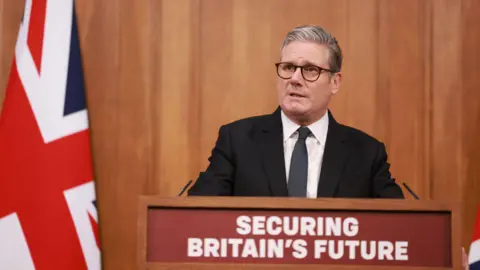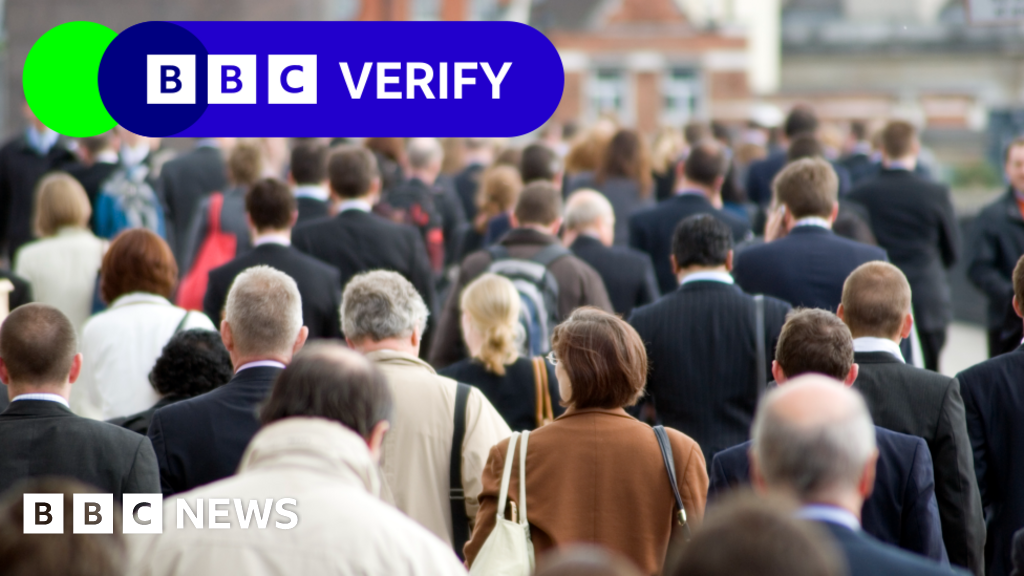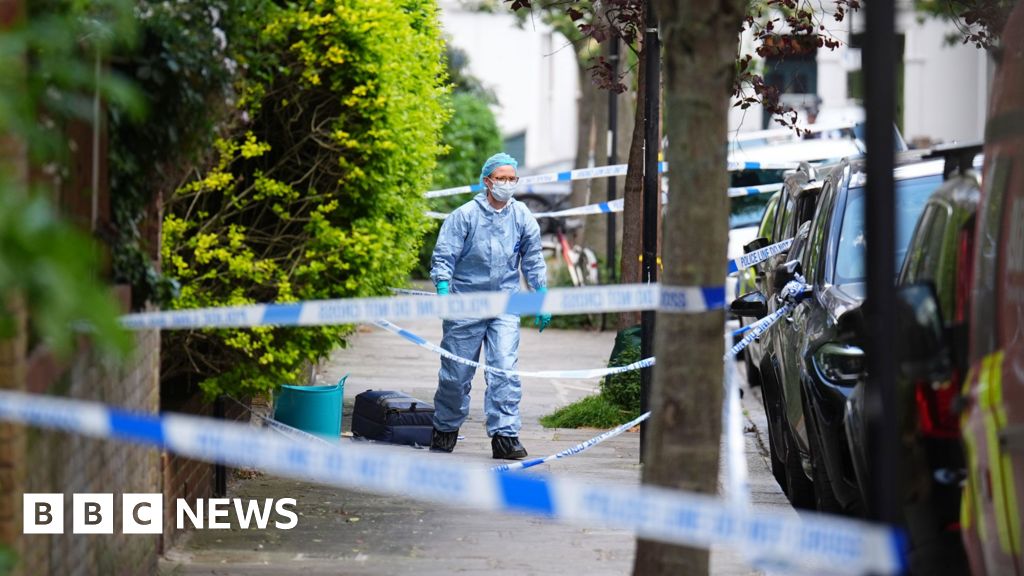ARTICLE AD BOX
Sam Francis
Political reporter

 PA Media
PA Media
Sir Keir Starmer has promised the government's new immigration measures will mean net migration falls "significantly" over the next four years.
The prime minister unveiled plans to ban recruitment of care workers from overseas, tighten access to skilled worker visas and raise the costs to employers in an effort to curb near record net migration.
The Home Office estimates the policies could lead to a 100,000 drop in immigration per year by 2029 - based on analysis of just eight of the core policies where "a quantitative assessment" could be made.
Conservative Leader Kemi Badenoch said Labour were "taking us for fools", adding: "This is nowhere near the scale of the change we need to see."
Sir Keir argued the proposals set out on Monday bring the immigration system "back into control".
The new plans, which tackle legal migration to the UK, will "make sure...it is selective, that we decide who comes to this country, and that it is fair," the prime minister said.
The government will scrap specialist visas that allow firms to hire health and social care workers from overseas.
Instead, firms will be required to hire British nationals or extend the visas of overseas workers already in the country.
Home Office figures estimate this change will cut the number of workers coming to the UK by between 7,000 and 8,000 a year.
Employers will also be asked to pay more to hire foreign staff.
The Immigration Skills Charge will increase by 32%, leading smaller firms to pay up to £2,400 to sponsor workers to come to the UK, while large firms will pay up to £6,600.
Universities could also be hit by higher charges. The government plans to look into a new tax on every international student enrolled in a UK university, with the proceeds redirected into skills training.
At the same time, colleges must meet stricter thresholds, with at least 95% of international students expected to start their course and 90% expected to finish.
The qualification requirements to apply for a skilled worker visa will go back up, reversing changes made under Boris Johnson's government.
It will mean new applicants will generally need a degree-level qualification, rather than the equivalent of A-level, which ministers say will make around 180 job roles ineligible for the visa route.
Lower qualification requirements will remain for sectors facing long-term shortages, or those considered key to the government's industrial strategy - although it is not yet clear what that means in practice, and the government's migration advisory body has been asked to recommend roles for inclusion.
The government also said:
- English language requirements for all work visas would increase
- The amount of time migrants need to live in the UK before applying for settled status would double from five years to 10, while setting up a fast-track system for "high-skilled, high-contributing" people
- A "limited pool" of refugees and displaced people recognised by the United Nations' agency responsible will be eligible to apply for jobs through existing skilled-worker routes.
The government will also explore changing the law on how the right to a family life contained in Article 8 in the European Convention on Human Rights (ECHR) is applied in immigration cases.
Government sources indicated a parliamentary vote on the plans was likely, to clarify Parliament's view to the courts.
Successive governments have tried unsuccessfully to reduce net migration, which is the number of people coming to the UK minus the number leaving.
Net migration climbed to a record 906,000 in June 2023, and last year it stood at 728,000.
Speaking before the publication of the Immigration White Paper, Sir Keir accused industries being "almost addicted to importing cheap labour" instead of "investing in the skills of people here and want a good job in their community".
Asked if net migration would fall every year due to the plans, Sir Keir said: "I'm promising it will fall significantly.
"And I do want to get it down by the end of this Parliament, significantly.
"That is what this plan is intended to achieve."
He also said there could be further restrictions saying, "if we do need to do more to release pressure on housing and public services, then mark my words we will".
The Conservatives have announced they plan to support policies such as tightening visas - which Badenoch argued were "watered down" versions of Tory policies.
The Conservatives want a binding migration cap, set by Parliament.
The Liberal Democrats said it was "right" for the government to tackle immigration, but the party's Home Affairs spokesperson Lisa Smart called for a "clear plan to make it easier to recruit British workers to fill vacancies instead".
Reform UK leader Nigel Farage said Labour had introduced the changes because it was "obviously very panicked" about the rise of his party at the local elections.
The White Paper was "tinkering around the edges," he argued and "even if the numbers do reduce, they'll still be at massive historic highs".
While the Green Party has denounced the proposals as a "panicked and misguided" attempt to "create headlines and try to win back Reform voters".
In a statement, Carla Denyer, the party's co-leader, said: "Far from rebuilding our communities, this government's reforms are going to make things worse."


Sign up for our Politics Essential newsletter to read top political analysis, gain insight from across the UK and stay up to speed with the big moments. It'll be delivered straight to your inbox every weekday.

 5 hours ago
6
5 hours ago
6








 English (US) ·
English (US) ·